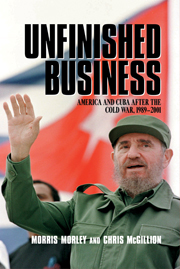Book contents
- Frontmatter
- Contents
- Acknowledgments
- Introduction
- 1 The Bush Administration and Cuba: From Cold War to Deep Freeze
- 2 Clinton and Cuba, January 1993 to February 1996: Closing the Options
- 3 Helms–Burton and the Triumph of Politics over Policy
- 4 Stirring the Waters: Clinton's Missed Opportunities
- Conclusion
- Postscript: Washington's Last Cold War
- Notes
- Index
Introduction
Published online by Cambridge University Press: 28 July 2009
- Frontmatter
- Contents
- Acknowledgments
- Introduction
- 1 The Bush Administration and Cuba: From Cold War to Deep Freeze
- 2 Clinton and Cuba, January 1993 to February 1996: Closing the Options
- 3 Helms–Burton and the Triumph of Politics over Policy
- 4 Stirring the Waters: Clinton's Missed Opportunities
- Conclusion
- Postscript: Washington's Last Cold War
- Notes
- Index
Summary
THE Cuban Revolution was a watershed in United States–Latin American relations, posing the most serious challenge to U.S. regional hegemony in the previous 100 years. Washington poured billions of dollars into an initially successful effort to politically isolate the revolutionary regime and restabilize the hemisphere in a manner conducive to U.S. interests, and mobilized resources and personnel on a global scale to sever the island's economic ties with the rest of the capitalist world. In the process, U.S. policymakers sought to foreclose the possibilities that the new Cuban socioeconomic “model” might be viewed by the rest of the Third World, especially Latin America, as a viable noncapitalist path to development. Over four decades, American presidents, whether Democrat or Republican, liberal or conservative, exhibited a marked reluctance to accommodate themselves to the permanence of Cuba's symbol of resistance to U.S. imperial ambitions. At minimum, each has maintained the core economic and political sanctions put in place in the early 1960s while searching for the right mix of coercion and diplomacy to achieve the consensus goal: the demise of Castro's government and its institutional structures.
The changing global context that followed the end of the Cold War, however, eliminated the key security concerns that were presumed to underpin U.S. policy in the early 1960s through the late 1980s. Although Cuba took measures Washington had repeatedly argued were necessary conditions for any move toward normalized relations – withdrawing its troops from Africa, halting the export of revolution to Latin America, and drastically reducing its military security ties with the former Soviet Union – the White House in the 1990s failed to respond in a measured and reciprocal fashion.
- Type
- Chapter
- Information
- Unfinished BusinessAmerica and Cuba after the Cold War, 1989–2001, pp. 1 - 9Publisher: Cambridge University PressPrint publication year: 2002



